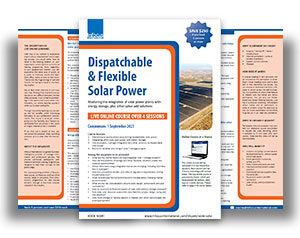Dispatchable & Flexible Solar Power (Online Course)
WHEN
Commences: 1 September 2023
WHERE
Live Online Course
Overview
Mastering the integration of solar power plants with energy storage, plus other value-add solutions
A business-focused training course designed to provide business developers with an accessible and concise, yet comprehensive understanding into how advanced utility-scale solar power projects are providing greater value to the industry, its investors and energy system planners alike.
‘Dispatchable’ solar power projects are crucial to the scalability of solar within energy systems, increasing its ability to replace conventional thermal power capacity while maintaining power system flexibility and resilience. Compared to traditional solar-only projects, new considerations include the components required and the project design, development and integration processes involved. Understanding the market drivers and new revenue opportunities that such hybrid, multi-technology projects create are key to making the business case.
This course will lead attendees through the technologies, processes and financial return and risk considerations for those involved in dispatchable solar project development, with a particular focus on solar + storage. Explanations will be provided in clear, business-friendly language accessible to non-engineers. If you need a valuable, up-to-the-minute and independent introduction to these crucial trends in the future development of solar power projects, this online course provides a unique learning opportunity.
Among the key points to be answered
- What are the market factors driving integrated solar + storage projects?
- How can the addition of storage and other flexibility solutions create new revenue opportunities?
- Which other technology integration trends are emerging, including hybridisation & hydrogen?
- How are competitive tenders and utility & regulatory requirements driving dispatchable solar?
- What do examples from around the world indicate about changing market environments?
- What are the key considerations around plant design, components and grid connectivity?
- How do economic & financial aspects of solar with/without storage compare?
- How does solar resource assessment data feed into project design, sizing and site selection?
- How much storage or flexible capacity is needed, and which technologies are most appropriate?
Live Online Course – How It Works
The structure of our virtual learning program is designed to keep the same levels of engagement and networking as our on-site public courses. Course content is delivered through our easy-to-use online learning platform and is supplemented by case studies and practical exercises.
Like our classroom-based public courses, you will have live interaction with our course facilitators and other participants. Our live online courses are led by our experienced instructors, who will provide you with easily digestible content, using knowledge learned from many years in the industry, during scheduled times. Delegates will receive copies of the course materials electronically.
This course is scheduled to take place over 4 live online sessions using virtual learning technology.
Course Agenda
Session 1: 1 September 2023, 7am – 10am GMT+0
Market trends and business cases driving ‘dispatchable’ solar power
- ‘Dispatchable’ solar power around the world (market-leader example: US trends)
- ‘Value erosion’ and declining energy revenues in solar power (examples: Australia, Germany, the US)
- Business risks from changing market prices, PPA prices, negative pricing and curtailment
- Variability, ramp rates, intraday balancing and other grid integration issues for solar PV
- The value of capacity and flexibility in future electricity systems, on different timescales
- Long-term capacity planning and storage requirements in future clean electricity mixes
- Replacing ‘peaking’ power plants and enabling the provision of ‘firm’ capacity (an illustrated ‘de-rating’ and electricity mix capacity margin calculation)
- How much storage is required? (‘short’ vs. ‘long’ durations)
- Examples of utility tenders, PPAs, market and policy mechanisms to encourage dispatchable solar (e.g. APS and NV Energy in the US; government tenders in India and South Africa)
- Why not add storage to solar? (Identifying project risk and barriers to development)
Session 2: 4 September 2023, 7am – 10am GMT+0
Integrating utility-scale solar power with battery storage
- Identifying key trends in battery storage and factors in technology choice
- Reviewing the components and layout variations of a utility-scale solar PV plant (illustrated with examples)
- Batteries, inverters, capacity considerations and the DC/AC interface in solar farms
- Co-location efficiencies through infrastructure sharing
- ‘DC-coupled’ vs ‘AC-coupled’ battery storage: comparing the pros and cons
- What are the barriers to battery storage retrofits? (criteria evaluation example)
- Grid export capacity determinants and constraints, including regulation
- Solar resource assessment for quantifying ‘clipping’ and low voltage energy losses (calculations using an example solar dataset)
- Project development, deployment, O&M and site selection considerations
- Issues of project risk, including resilience, safety and environmental factors
Session 3: 5 September 2023, 7am – 10am GMT+0
Hybrid projects, hydrogen integration and other solutions to dispatchable solar power
- Non-battery storage solutions and their relevance to solar power
- Floating solar and solar + hydropower projects (example: Alqueva, Portugal)
- Hybrid solar + wind and solar + wind + storage projects: quantifying capacity and cost benefits
- Resource assessment and relative capacity sizing (illustrated calculation using example resource data)
- The specific considerations around off-grid, remote site requirements
- Project planning and site selection criteria for hybrid projects
- Dispatchable solar without storage: which advanced operational capabilities exist? (example: First Solar)
- Virtual power plants and distributed solutions to solar power flexibility (examples from US, Australia)
- Power to gas (‘green hydrogen’): which infrastructure is required?
- Early solar + hydrogen projects, including solar + hydrogen + battery hybrids (examples from Spain, France and Australia)
Session 4: 6 September 2023, 7am – 10am GMT+0
The economics of solar + storage and other flexible solar power solutions
- Quantifying how solar resource and its variation impacts storage sizing and optimisation (illustrated using an example solar resource dataset)
- How much energy storage and what relative solar and storage power capacities are required?
- (How) can solar + storage fully replace dispatchable thermal power generation? (example: sizing solar to replace natural gas)
- Comparing the cost structure and finances of solar-only vs. solar-plus-storage (example data from NREL and others)
- Examining the LCOE of solar + storage, including comparisons with solar on its own (published examples, including Lazard, plus illustrated calculations in Excel)
- The impacts of battery degradation and cost reduction on the business case
- Revenue streams and ‘revenue stacking’ opportunities
- Comparing the potential values of electrons vs. molecules (hydrogen)
- Understanding the impact of the solar resource on the cost of produced hydrogen (illustrated calculation in Excel)
- Other essential investment, project risk and financing considerations
- Summary: key considerations for flexible solar project and business planning (example checklist)
Training Methodology
The agenda will combine presented materials with plenty of opportunity for Q&A, interactive discussions, and the use of quantitative models to illustrate key learning points. Current market examples and data are utilised wherever helpful.

Pre-Course Questionnaire
We would like to customise the workshop based on your specific needs. Pre-Course Questionnaire will be sent prior to the workshop for analyse in advance and to be addressed during the course.

Course Certificate
Upon the successful completion of this course, you will receive a Certificate of Completion bearing the signatures from both the Course Director and the Course Organiser. This Certificate will testify your endeavour and serve towards your professional advancement.
Who Will Attend
- Investors, including commercial and development banks, venture capital and private equity
- Power generation companies, utilities and IPPs
- Policy makers and policy advisors
- Transmission/Distribution system operators
- Commercial services suppliers (law, insurance etc.)
- Equipment vendors and EPC contractors
- Large energy users and electricity buyers
You Might Also Be Interested In
Offshore Wind (Online Course)
A comprehensive online course to one of renewable energy’s fastest-growing sectors
Commences: 2 October 2023
Mastering Solar Power (Online Course)
A comprehensive, up-to-date and business-focused roadmap to success in delivering solar power growth, today and tomorrow
Commences: 23 October 2023
Energy Storage (Online Course)
A business-focused assessment of energy storage opportunities, competing solutions and project delivery essentials







